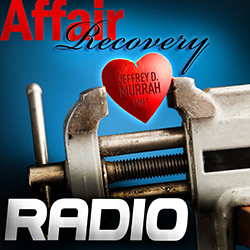When you hurt, you want someone to talk to. the challenge is finding the right people you can open up to. self-disclosure leaves you vulnerable.
Dealing with the risk of self-disclosure <<– listen to the audio here
Hi, this is Jeff Murrah welcoming you back to Affair Recovery Radio. Today’s topic is dealing with the risk of self-disclosure.
I know when you’re hurting you want someone to talk to. And that’s natural, because when we’re hurting it makes it much worse when you’ve got to hold it all in and you’ve got no one to talk to. The challenge is you’ve got to find the right people that you can open up to.
Because when you’re hurting you’re in a position where you’re very vulnerable. Opening up makes you even more vulnerable. If you open up to the wrong people, it can often create more problems for you and in overcoming the affair, than what you wanted in the first place.
Your hands are already full, or plate’s already overloaded, however you want to put it, with the affair.
When you’ve got your dance card full, your plate is full with the affair, you don’t need more baggage. Opening up to the wrong people and self-disclosing to the wrong people will create more baggage and more problems for you than you needed in the first place.
In terms of the solution, you’re going to need to exercise caution with self-disclosure. There’s several ways to do this.
One is to limit the self-disclosure only to the people who are safe. And by safe I mean those people who are not going to take advantage of you. Because there are some people, as terrible as it sounds, that take advantage of other people’s bad times.
There are some people that may use the crisis of the affair as an opportunity to make a pass at you, or to have an affair with you. That’s the kind of complication you don’t need right now.
When people want to get you out of the pain, rather than help you go through it, that’s typically a danger sign. Anything that gets you out of the pain fast has a potential to get you into trouble fast.
Rather than get you out of the pain you need people that will sit down and go through the pain with you. That will cry with you and hear you out, and you can hear them out. That’s the type of thing that you need right now.
So limit self-disclosure to the people who are safe.
Number two, you’re going to need to realize that silence is your friend. When we’re hurting, many times having to deal with silence often increases the emotions that we’re feeling, increases the intensity of those emotions.
So what we do, we just kind of ramble off at the mouth, or a lot of times they used to use the expression diarrhea of the mouth. People just keep on talking to fill up the silence.
In terms of self-disclosure you need the silence. Sometimes you need to gather your thoughts together. Sometimes you need feelings to sink in. For this reason you’re going to need to start to accept silence as your friend, rather than always fighting against the silence or not wanting to sit with people in silence.
You’re going to need to get used to that, because the silence is actually something that can help you. Quit seeing it as your enemy.
Number three, do not self-disclose in high risk situations. What I mean by high risk situations, when you’re in an environment where there’s a lot of drug and alcohol use, or it’s late at night, that’s typically high risk. That puts you where you are even more vulnerable.
Even if you are talking to your spouse, self-disclosing to them under such circumstances can be potentially dangerous. You want to be careful with what you do share.
Once again, when it comes down to dealing with the risk of self-disclosure you’re going to need to exercise caution. The three things that I laid out to you to help you to deal with self-disclosure are, number one, limit self-disclosure to people who are safe. Number two, accept silence as your friend. And the old expression silence is golden is very true, especially during affair recovery.
Number three, do not self-disclose in high risk situations. Doing so is asking for trouble.
These are all things, all actions that you can start to work on now. And I encourage you to do so. I know that you don’t like the pain that you’re in, but you’re going to have to be careful who you share it with. Because it can be something that can help you, in the case where you share it with the right people. It can hurt you if you share with the wrong people. Go ahead, practice these things, get them in place.
Best Regards,
Jeff

















